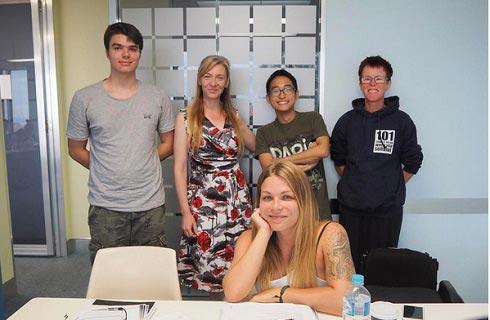生物医学工程哲学博士
Doctor of Philosophy in Biomedical Engineering

学历文凭
Ph.D.

专业院系
Biomedical Engineering

开学时间

课程时长

课程学费

国际学生入学条件
IDP—雅思考试联合主办方

雅思考试总分
7.0
- 雅思总分:7
- 托福网考总分:100
- 托福笔试总分:160
- 其他语言考试:PTE Academic - 68
CRICOS代码:
申请截止日期: 请与IDP联系 以获取详细信息。
课程简介
As one of the top research universities in the U.S., Case Western Reserve has a legacy of innovation. Our PhD in Biomedical Engineering program is a prime example. This interdisciplinary program, among the first of its kind in the world, combines medical and engineering disciplines to provide you with a strong foundation for your career in academia, government or industry. Specialize in biomaterials, neural engineering, cardiovascular systems, or another concentration—it’s entirely up to you. Plus, many of our students receive program funding, so you can focus on what’s most important: your academics.<br><br>The Department of Biomedical Engineering was established in 1968 as a joint department between the Case School of Engineering and the School of Medicine at Case Western Reserve University. Biomedical Engineering uses engineering principles to develop innovative and unique insight into physiological mechanisms and solutions to a wide range of biomedical and clinical challenges. As one of the pioneering programs in the world, the department has established rigorous yet flexible educational programs that are emulated by many other institutions and is a national leader in cutting-edge research in several important areas. The department’s educational programs provide training in cellular and subcellular mechanisms for understanding fundamental physiological processes, in dealing with biomedical problems at the tissue and organ system level, and in integrating this knowledge in systems approaches to solving clinical problems.
相关申请
 预科
预科 奖学金
奖学金 实习机会
实习机会 在校学习
在校学习 跨境学习
跨境学习 校园授课-线上开始
校园授课-线上开始 在线/远程学习
在线/远程学习
开学时间&学费
学费信息仅供参考,请与IDP联系以获取详细信息
| 开学时间 | 时长 | 学费 | 地点 |
|---|
学校排名

世界排名132
数据源:
泰晤士高等教育世界大学排名
关于凯斯西储大学

虽然由两所大学合并建校于1967年的凯斯西储大学“官方”校史仅有50多年,但它的两个前身凯斯理工学院和西储大学却都有着百余年的深厚底蕴。诡异的名字并不能掩盖CWRU学术上的强势,凯斯西储美国拿到的联邦研究基金最多的15所私立大学之一;常年排名US News综合大学排名30名左右对于一个本科生只有4000人的“小”学校来说,如果没有背后雄厚的资金支持与强大的学术实力,几乎是不可能的。凯斯西储为本科生提供两大实习项目,Co-op与CWR practicum,加上学生自愿的暑期实习,一切都是为了更好的吸收顶尖专业课所提供的理论知识。CWRU的法学院是最早一批被美国律师协会承认的法学院,并且是美国法学院协会的创始成员;商学院中提供全美最好的10个非营利管理专业之一;此外,CWRU还拥有全美Top20的医学院与护理学院,和私立大学中最好的工程学院之一。学校所在的University Circle地区拥有50多个著名的文化、医疗和教育机构,学生步行即可到达。
本校相关课程
其他相关课程

生物医学工程应用科学硕士
 达尔豪斯大学
达尔豪斯大学学历文凭
Masters Degree
开学日期
课程费用总额


生物医学工程技术文凭
 北阿尔伯塔理工学院
北阿尔伯塔理工学院学历文凭
Bachelor Degree
开学日期
课程费用总额


生物医学工程学士学位
 多伦多都会大学
多伦多都会大学学历文凭
Bachelor Degree with Honours
开学日期
课程费用总额


生物医学工程应用科学硕士
 渥太华大学
渥太华大学泰晤士高等教育世界大学排名:188
学历文凭
Masters Degree
开学日期
课程费用总额


工程科学应用科学学士-生物医学工程(荣誉学位)
 西蒙菲莎大学
西蒙菲莎大学学历文凭
Bachelor Degree with Honours
开学日期
课程费用总额


生物医学工程学硕士
 卡尔加里大学
卡尔加里大学学历文凭
Masters Degree
开学日期
课程费用总额










 美国
美国





